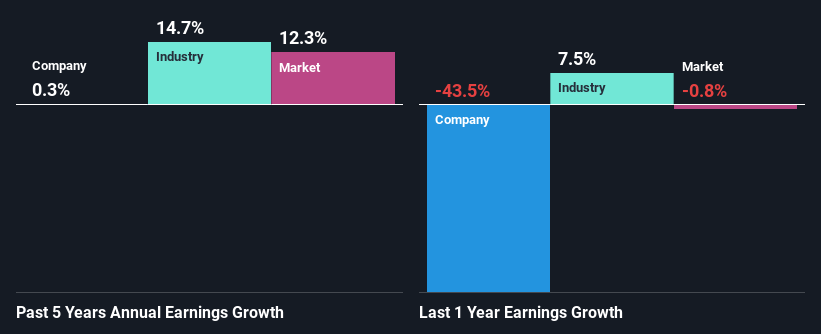SSE’s (LON:SSE) stock is up by a considerable 16% over the past three months. However, in this article, we decided to focus on its weak fundamentals, as long-term financial performance of a business is what ultimately dictates market outcomes. Particularly, we will be paying attention to SSE’s ROE today.
Return on equity or ROE is an important factor to be considered by a shareholder because it tells them how effectively their capital is being reinvested. In simpler terms, it measures the profitability of a company in relation to shareholder’s equity.
See our latest analysis for SSE
How To Calculate Return On Equity?
The formula for return on equity is:
Return on Equity = Net Profit (from continuing operations) ÷ Shareholders’ Equity
So, based on the above formula, the ROE for SSE is:
6.8% = UK£726m ÷ UK£11b (Based on the trailing twelve months to September 2023).
The ‘return’ is the profit over the last twelve months. So, this means that for every £1 of its shareholder’s investments, the company generates a profit of £0.07.
What Is The Relationship Between ROE And Earnings Growth?
So far, we’ve learned that ROE is a measure of a company’s profitability. We now need to evaluate how much profit the company reinvests or “retains” for future growth which then gives us an idea about the growth potential of the company. Assuming everything else remains unchanged, the higher the ROE and profit retention, the higher the growth rate of a company compared to companies that don’t necessarily bear these characteristics.
SSE’s Earnings Growth And 6.8% ROE
At first glance, SSE’s ROE doesn’t look very promising. We then compared the company’s ROE to the broader industry and were disappointed to see that the ROE is lower than the industry average of 10%. Hence, the flat earnings seen by SSE over the past five years could probably be the result of it having a lower ROE.
We then compared SSE’s net income growth with the industry and found that the company’s growth figure is lower than the average industry growth rate of 15% in the same 5-year period, which is a bit concerning.
Earnings growth is a huge factor in stock valuation. The investor should try to establish if the expected growth or decline in earnings, whichever the case may be, is priced in. Doing so will help them establish if the stock’s future looks promising or ominous. One good indicator of expected earnings growth is the P/E ratio which determines the price the market is willing to pay for a stock based on its earnings prospects. So, you may want to check if SSE is trading on a high P/E or a low P/E, relative to its industry.
Is SSE Using Its Retained Earnings Effectively?
The high three-year median payout ratio of 52% (meaning, the company retains only 48% of profits) for SSE suggests that the company’s earnings growth was miniscule as a result of paying out a majority of its earnings.
Moreover, SSE has been paying dividends for at least ten years or more suggesting that management must have perceived that the shareholders prefer dividends over earnings growth. Our latest analyst data shows that the future payout ratio of the company over the next three years is expected to be approximately 43%. Regardless, the future ROE for SSE is predicted to rise to 15% despite there being not much change expected in its payout ratio.
Summary
In total, we would have a hard think before deciding on any investment action concerning SSE. Because the company is not reinvesting much into the business, and given the low ROE, it’s not surprising to see the lack or absence of growth in its earnings. That being so, the latest analyst forecasts show that the company will continue to see an expansion in its earnings. Are these analysts expectations based on the broad expectations for the industry, or on the company’s fundamentals? Click here to be taken to our analyst’s forecasts page for the company.
Have feedback on this article? Concerned about the content? Get in touch with us directly. Alternatively, email editorial-team (at) simplywallst.com.
This article by Simply Wall St is general in nature. We provide commentary based on historical data and analyst forecasts only using an unbiased methodology and our articles are not intended to be financial advice. It does not constitute a recommendation to buy or sell any stock, and does not take account of your objectives, or your financial situation. We aim to bring you long-term focused analysis driven by fundamental data. Note that our analysis may not factor in the latest price-sensitive company announcements or qualitative material. Simply Wall St has no position in any stocks mentioned.












